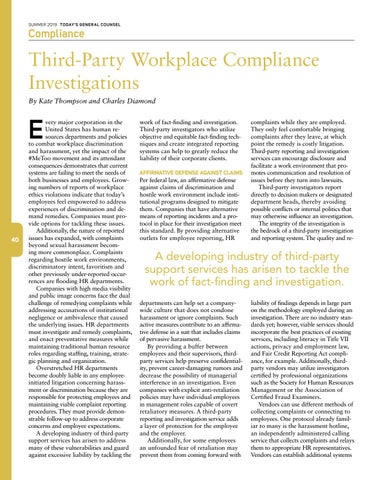SUMMER 2019 TODAY’S GENER AL COUNSEL
Compliance
Third-Party Workplace Compliance Investigations By Kate Thompson and Charles Diamond
E
40
very major corporation in the United States has human resources departments and policies to combat workplace discrimination and harassment, yet the impact of the #MeToo movement and its attendant consequences demonstrates that current systems are failing to meet the needs of both businesses and employees. Growing numbers of reports of workplace ethics violations indicate that today’s employees feel empowered to address experiences of discrimination and demand remedies. Companies must provide options for tackling these issues. Additionally, the nature of reported issues has expanded, with complaints beyond sexual harassment becoming more commonplace. Complaints regarding hostile work environments, discriminatory intent, favoritism and other previously under-reported occurrences are flooding HR departments. Companies with high media visibility and public image concerns face the dual challenge of remedying complaints while addressing accusations of institutional negligence or ambivalence that caused the underlying issues. HR departments must investigate and remedy complaints, and enact preventative measures while maintaining traditional human resource roles regarding staffing, training, strategic planning and organization. Overstretched HR departments become doubly liable in any employeeinitiated litigation concerning harassment or discrimination because they are responsible for protecting employees and maintaining viable complaint reporting procedures. They must provide demonstrable follow-up to address corporate concerns and employee expectations. A developing industry of third-party support services has arisen to address many of these vulnerabilities and guard against excessive liability by tackling the
work of fact-finding and investigation. Third-party investigators who utilize objective and equitable fact-finding techniques and create integrated reporting systems can help to greatly reduce the liability of their corporate clients. AFFIRMATIVE DEFENSE AGAINST CLAIMS
Per federal law, an affirmative defense against claims of discrimination and hostile work environment include institutional programs designed to mitigate them. Companies that have alternative means of reporting incidents and a protocol in place for their investigation meet this standard. By providing alternative outlets for employee reporting, HR
complaints while they are employed. They only feel comfortable bringing complaints after they leave, at which point the remedy is costly litigation. Third-party reporting and investigation services can encourage disclosure and facilitate a work environment that promotes communication and resolution of issues before they turn into lawsuits. Third-party investigators report directly to decision makers or designated department heads, thereby avoiding possible conflicts or internal politics that may otherwise influence an investigation. The integrity of the investigation is the bedrock of a third-party investigation and reporting system. The quality and re-
A developing industry of third-party support services has arisen to tackle the work of fact-finding and investigation. departments can help set a companywide culture that does not condone harassment or ignore complaints. Such active measures contribute to an affirmative defense in a suit that includes claims of pervasive harassment. By providing a buffer between employees and their supervisors, thirdparty services help preserve confidentiality, prevent career-damaging rumors and decrease the possibility of managerial interference in an investigation. Even companies with explicit anti-retaliation policies may have individual employees in management roles capable of covert retaliatory measures. A third-party reporting and investigation service adds a layer of protection for the employee and the employer. Additionally, for some employees an unfounded fear of retaliation may prevent them from coming forward with
liability of findings depends in large part on the methodology employed during an investigation. There are no industry standards yet; however, viable services should incorporate the best practices of existing services, including literacy in Title VII actions, privacy and employment law, and Fair Credit Reporting Act compliance, for example. Additionally, thirdparty vendors may utilize investigators certified by professional organizations such as the Society for Human Resources Management or the Association of Certified Fraud Examiners. Vendors can use different methods of collecting complaints or connecting to employees. One protocol already familiar to many is the harassment hotline, an independently administered calling service that collects complaints and relays them to appropriate HR representatives. Vendors can establish additional systems
